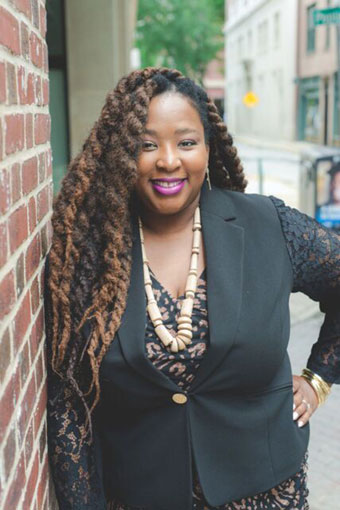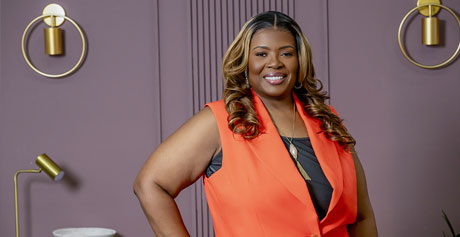Setting the Standard for Fairness & Equity in the Criminal Justice System, Meet Community Engagement & Movement Building Counsel for the Southern Center for Human Rights, Tiffany Williams Roberts
 Q: What led to your decision to pursue a career in the nonprofit sector?
Q: What led to your decision to pursue a career in the nonprofit sector?
TWR: I was raised by a community organizer and was always taught that service to community was a part of life. I chose to become a community lawyer after attending law school and falling in love with both public defense and social justice activism. As a public defender, I yearned to do more for my clients than represent them in the courtroom. My friends and I co-founded a small community organization, Building Locally to Organize for Community Safety (BLOCS) in 2009 and we were able to land significant wins around police accountability and transparency. Because of this, I will always have deep love and respect for the people on the ground who celebrate what some call small victories. In my experience, SCHR was always supportive of those victories, which makes me excited to now be part of the organization.
Q: What is SCFHR about and what do you all do?
TWR: SCHR is a non-profit law firm committed to decriminalizing race and poverty though a strategy involving litigation and policy work. I am Community Engagement and Movement Building Counsel, which means that I am responsible for anchoring work that strengthens our relationships with local grassroots and grass tops organizations working to improve the conditions of people most impacted by our racist, classist criminal legal system. I have the pleasure of getting to know amazing organizers in Georgia who defy the odds everyday to push powerful forces toward justice.
Q: How has SCFHR made a difference and what impact do you still wish to see made?
TWR: SCHR has led some of the most impactful appellate litigation around capital punishment, prison conditions and pretrial incarceration in the South. We have also been blessed to work with fierce community organizations such as Women on the Rise, Racial Justice Action Center and SONG to lead the charge on bail reform and decarceration in Atlanta. I look forward to us working with a geographically broader coalition of organizations and impacted community in the future to support even bolder transformation.
Q: What do you love most about SCFHR and the work you all do?
TWR: I love the unwavering commitment every staff member exhibits to our mission. There is a kindness and camaraderie in our office that I have not experienced elsewhere.
Q: What is it you like to say to potential donors and volunteers?
TWR: Thank you for believing that the law can be a tool for good when it is coupled with a sincere respect for the everyday heroes we support with our work.
Q: Do you have any advice you can share for those women who may want to pursue a career in the Nonprofit sector?
TWR: Find your place in service before seeking employment in the non-profit sector. When you find an organization that aligns with your politics and lifestyle, consider what you tangibly add to their work. I believe that can be the beginning of a perfect fit.
Q: Can you tell our audience one of your most memorable moments your career?
TWR: I will never forget the day that bail reform passed in Atlanta. I had not yet joined the SCHR team, but I was part of the group of organizers and lawyers who advocated for the law. Witnessing a unanimous vote in City Council Chambers was something I know would never have been possible without years of groundwork performed by people I admire greatly.
Q: What's the greatest fear you've had to overcome to get where you are today?
TWR: Heartbreak of disappointing community.
Q: What’s one lesson you’ve learned in your career that you can share with our audience?
TWR: To never be so arrogant to believe that an academic degree confers wisdom. Our specialized knowledge but it never more valuable than the needs of the people we serve. We are vessels, not dictators.
Q: Which woman inspires you and why?
TWR: My mother is my daily inspiration. She raised three children, all of whom were able to pursue our passions through college and career. She stressed service to others as important irrespective of what our financial resources may have been. In her lifetime, she has helped so many people outside of our family reach their dreams, asking nothing in return. That is the definition of service.
Q: What advice would you give to young women who want to succeed in the workplace?
TWR: Honor yourself and do not apologize for seeking wellness and balance.
Q: What are some of the challenges you feel women face today?
TWR: I believe that black women in movement work experience many people feeling entitled to our labor. We can be used as workhorses who are erased from history. We combat that by telling our own stories.
Five Things About Tiffany Williams Roberts
1. If you could talk to one famous person past or present, who would it be and why?
Ella Baker-She dominated organizing behind the scenes during a time when mostly men were celebrated. I would love to know what grounded her.
2. What’s the best advice anyone’s ever given you?
It is ok to take care of yourself.
3. What’s your favorite movie?
I don’t really have a favorite movie (I know, that’s awful).
4. What app can’t you live without?
I am working to journal more and recently discovered DayOne Journal. So, let’s say that.
5. Do you have a favorite quotation?
“Each generation must, out of relative obscurity, discover its mission, fulfill it or betray it.” Frantz Fano


